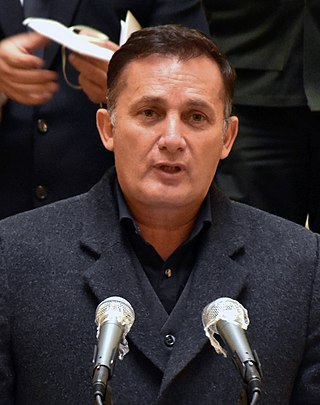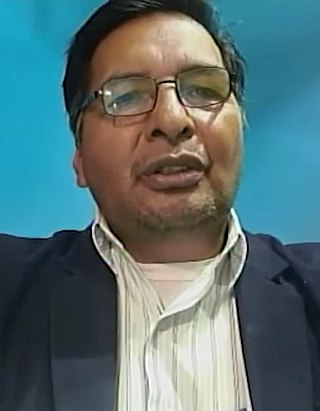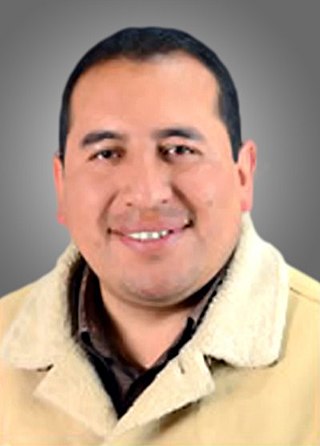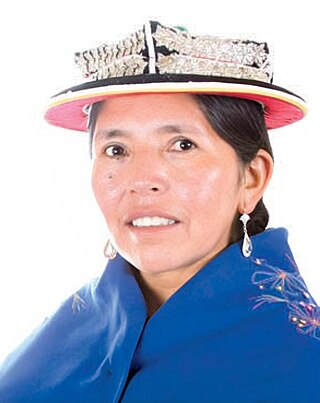
The politics of Bolivia takes place in a framework of a presidential representative democratic republic, whereby the president is head of state, head of government and head of a diverse multi-party system. Executive power is exercised by the government. Legislative power is vested in both the government and the two chambers of parliament. Both the Judiciary and the electoral branch are independent of the executive and the legislature. After the 2014 Bolivian general election, 53.1% of the seats in national parliament were held by women, a higher proportion of women than that of the population.

Council of Ministers of Bolivia, or Cabinet of Bolivia, is part of the executive branch of the Bolivian government, consisting of the heads of the variable number of government ministries. The Council of Ministers are ministers of state and conduct the day-to-day business of public administration within Bolivia. The President of Bolivia may freely reorganize the executive branch, with the most recent comprehensive reorganization occurring in February 2009. Since then, the Ministry for the Legal Defense of the State has become the independent office of Solicitor General, and the Ministry of Communication has been created.

The Ministry of Cultures, Decolonization, and Depatriarchalization is the ministry of the government of Bolivia that provides for the preservation and protection of the cultures and artistic expressions of the indigenous peoples of Bolivia as well as promotes the country's tourism sector and process of decolonization and depatriarchalization.

Arturo Carlos Murillo Prijic is a Bolivian businessman, hotelier, and politician who served as the minister of government from 2019 to 2020. As a member of the National Unity Front, he previously served as a senator for Cochabamba from 2015 to 2019 and as a plurinominal member of the Chamber of Deputies from Cochabamba from 2006 to 2010.

Oscar Miguel Ortiz Antelo is a Bolivian businessman and politician who served as minister of economy and public finance from July to September 2020 and as minister of productive development from May to July 2020. As a member of the Social Democratic Movement, he previously served two terms as a senator for Santa Cruz from 2015 to 2020 on behalf of the Democratic Unity coalition and from 2006 to 2010 on behalf of the Social Democratic Power alliance. Nearing the end of his second term, Ortiz was his party's presidential candidate, attaining fourth place in the annulled 2019 general elections. During his first term, he served as president of the Senate from 2008 to 2010, the last opposition legislator to preside over the upper chamber as of 2025. Outside of national politics, Ortiz served as president of the Union of Latin American Parties from 2018 to 2021 and has been the rector of the Bolivian Catholic University at Santa Cruz since 2021.

Yerko Martín Núñez Negrette is a Bolivian agronomist and politician who served as minister of the presidency from 2019 to 2020. A member of the Social Democratic Movement, he previously served as minister of public works from November to December 2019. Throughout his ministerial tenure, Núñez was noted as a key person of influence in the transitional government and a "right-hand" to President Jeanine Áñez, a fellow Beni native. Prior to his appointment, he served as senator from Beni from 2015 to 2019 on behalf of the Democratic Unity coalition. As a member of Beni First, Núñez served as mayor of Rurrenabaque from 2010 to 2014; he previously held the position for two terms from 2000 to 2003 and 2005 to 2010 as part of the Revolutionary Nationalist Movement. Núñez's mayoral tenure saw strides made for Rurrenabaque's ecotourism industry, which generated increased economic growth for the city.

Luis Fernando López Julio is a Bolivian businessman, retired military officer, and politician who served as minister of defense from 2019 to 2020. Appointed in the tail end of the 2019 political crisis, López, along with Minister of Government Arturo Murillo, quickly became characterized as the "strong men" of the Jeanine Áñez administration and were implicated in the deadly events at Senkata and Sacaba. López was called to hearings by the Plurinational Legislative Assembly but failed to present himself three consecutive times, ultimately resulting in his censure by the legislature. As per the terms of the Constitution, he was dismissed as minister but, exploiting a loophole in the document's text, he was reappointed just a day later. Soon after, reports revealed his participation in the tear gas case, which accused the ministries of government and defense of irregularly purchasing non-lethal weapons at inflated prices.

Fernando Iván Vásquez Arnez is a Bolivian geotechnical and mining engineer and politician who served as minister of mining and metallurgy from 8 May to 30 May 2020. He previously served as vice minister of productive development and metallurgical mining from 2019 to 2020 and as director of the environment and public consultation from 2006 to 2011. Shortly into his ministerial term, Vásquez stated that his white complexion made him incapable of being a member of the Movement for Socialism, causing broad condemnation and his removal from office less than a month after being appointed.
Events in the year 2021 in Bolivia.

The Arce Cabinet constitutes the 222nd cabinet of the Plurinational State of Bolivia. It was formed on 9 November 2020, one day after Luis Arce was sworn in as the 67th president of Bolivia following the 2020 general election, succeeding the Áñez Cabinet. The cabinet is composed entirely of members of the ruling Movement for Socialism. Described as a "technocratic" cabinet, it has been noted for the low-profile and youth of some of its members as well as its political distance from former president Evo Morales.

Adrián Rubén Quelca Tarqui is a Bolivian politician, professor, and trade unionist who served as minister of education from 2020 to 2021. A member of the Communist Party, Quelca worked to implement a project for a "semi-present" school system in which partial in-person learning would be coupled with radio and tele-education. Under his management, schools previously closed early by the past administration were reopened to blended learning for the 2021 year. Despite initial hopes for fully in-person classes by the second half of the year, results never panned out, and his administration was hampered by an ongoing corruption investigation that ultimately culminated in the presentation of charges and his resignation on 12 November 2021.
Events from the year 2022 in Bolivia.

María Isabel Fernández Suárez is a Bolivian journalist and politician who served as minister of communication from January to June 2020. Fernández was the final official to serve in that post, with the Ministry of Communication being abolished during her term. She subsequently served as vice minister of communication from June 2020 until the conclusion of the transitional government of Jeanine Áñez in November 2020.

Martha Yujra Apaza is a Bolivian politician and trade unionist who served as minister of cultures and tourism from 2019 to 2020. A prominent trade union leader in El Alto, Yujra was the only indigenous member of the Jeanine Áñez Cabinet and was the final official to head the Ministry of Cultures and Tourism; the institution was abolished during her term. During her tenure, Yujra's office primarily dealt with the effects of the COVID-19 pandemic on the cultural sector, devising means of alleviating the economic ramifications of quarantine measures on artisans and entertainers. She subsequently served as a counselor at the Embassy of Bolivia in Quito from July to November 2020. Prior to serving as minister, Yujra gained notoriety for her fierce opposition to the government of Evo Morales. In 2017, she led a breakaway faction of the pro-government El Alto Regional Workers' Center. As its executive secretary, Yujra aligned the union with the Bolivia Says No alliance, running unsuccessfully to represent La Paz in the Chamber of Deputies in the annulled 2019 general elections.

Hernán Iván Arias Durán, often referred to as El Negro, is a Bolivian politician, political analyst, and sociologist serving as mayor of La Paz since 2021. A member of For the Common Good, of which he is the leader, he previously served as minister of public works from 2019 to 2020 and vice minister of popular participation from 2001 to 2002. A specialist in decentralized public management and indigenous matters, he was the private secretary of Víctor Hugo Cárdenas, the first indigenous vice president, and was part of the team that drafted the Law of Popular Participation, which implemented municipalism in Bolivia through the direct election of local authorities.

Luis Gallego Condori is a Bolivian lawyer and politician who served as a member of the Chamber of Deputies from Potosí, representing circumscription 39 from 2010 to 2015.
María Magdalena Cajías de la Vega is a Bolivian academic, historian, and politician who served as minister of education from 2007 to 2008. Cajías spent most of her professional career teaching history at the Higher University of San Andrés, in addition to holding a number of consultancy posts for intergovernmental organizations and government bodies. She authored multiple published historical titles, focusing on the fields of women's and labor history. In 2006, Cajías was brought on as a consultant for the Ministry of the Presidency before being appointed to head the Ministry of Education the following year. After a brief return to academia following the conclusion of her ministerial term, Cajías returned to public administration as consul general in Santiago, where she served from 2014 to 2019. In 2021, she was named as a member of the editorial board of the Bolivian Bicentennial Library.

Wilson Pedro Santamaría Choque is a Bolivian lawyer, politician, and sociologist who served as vice minister of public security from 2019 to 2020. A graduate of the Higher University of San Andrés with extensive postgraduate studies, Santamaría entered the political field as a partisan of the National Unity Front and served as the party's municipal leader for La Paz. In 2014, he was elected as a party-list member of the Chamber of Deputies, representing the La Paz Department from 2015 to 2019.
The following is a chronology of notable events from the year 2023 in Bolivia.

Carmen García Mamani is a Bolivian academic, politician, and trade unionist who served as senator for Potosí from 2010 to 2015. A member of the Movement for Socialism, she previously served on the Tomave Municipal Council from 2000 to 2005.


















